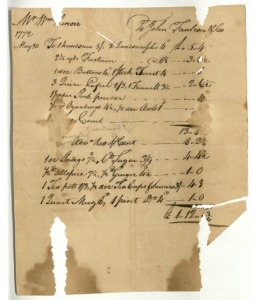Accounting ledger from the Lenoir Family Papers documenting the purchase of garlic powder, sugar, ginger, and allspice signed by William Lenoir on May 30, 1772.
Identification:
This accounting slip was selected from the Lenoir Family Papers, section 3 subsection 3.1.1 – Household and Plantation Financial and Legal Papers, folder 426 subfolder 264 from the Wilson Library special documents archive. The slip records the purchase of household items and consumables for the household of William Lenoir, the first president of the University of North Carolina at Chapel Hill Board of Trustees. Marked May 30, 1772, this account documents a purchase completed before the United States of America had declared their independence from England, and the items were subject to royal taxation. This accounting ledger indicates that the estate was purchasing sugar, ginger, garlic powder, and allspice, which were used both in the seasoning of foods as well as drinks such as mulled wine, ginger ales, and tea. Note that one can credibly infer from this evidence that the estate was also purchasing other spices not listed on this particular accounting slip, which provides evidence of the wealth and luxury available to the Lenoir Family.
Contextualization:
English plantations and production camps in India and the Caribbean constituted the origins of the majority of spice import sources to the British American colonies, which were subject to taxation by the British East India Company at the direction of King George III of England. The taxation of spices and imports such as tea (also marked as purchased on the accounting slip above) highlighted a divide in the social hierarchy of people who could afford these products and those who could not. Spices in the New World and Europe have an expensive history often built upon the backs of the exploited poor, and only the very rich of the colonies could consistently afford to pay both the high cost of the spices as well as the royal taxes imposed upon American imports. William Lenoir marks that his estate purchased sugar for $4.50. According to the Bureau of Labor Statistics consumer price index, prices were 2,670.84% higher in 1772 than they are now due to dollar-value-inflation, meaning that the $4.50 spent on sugar in this ledger is equitable to $124.69 dollars by today’s dollar value. A model of comparison such as this inflation calculation, although inaccurate in some ways as industry and shipping cost improvements have also contributed to the lowering of spice costs, provides a valuable vantage of social evaluation. The glaring difference between the Lenoir Family being able to purchase sugar for large sums of money and the knowledge that the slaves which operated the Lenoir Family plantations were not paid for their labor provides context to the state of the American South, even long before the American Civil War.
Citations:
“Consumer Price Index (CPI) Databases.” U.S. Bureau of Labor Statistics, U.S. Bureau of Labor Statistics, www.bls.gov/cpi/data.htm.
Lenoir, William. “Lenoir Family Papers.” Household and Plantation Financial and Legal Papers, 30 May 1772. Wilson Library – Special Documents Archive. The University of North Carolina at Chapel Hill. finding-aids.lib.unc.edu/00426/#.
Honor Pledge – I certify that no unauthorized assistance has been received or given in the completion of this work.
Signature – Erik Feldmann
